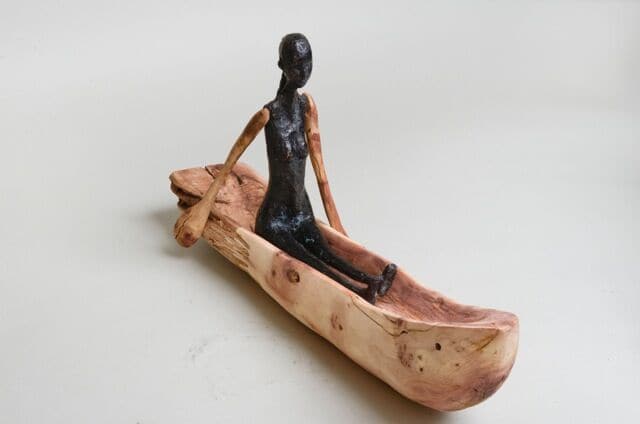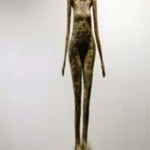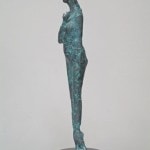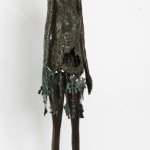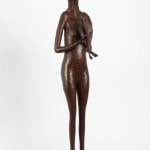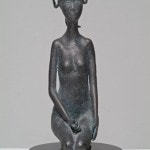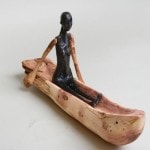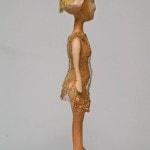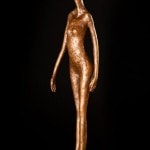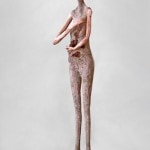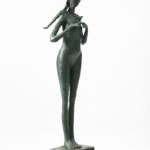Images
Book an appointment to view the artist’s studio
Click here to view available works
Bio
Hadiya Finley gracefully models wood, clay, and other found materials into sculptural figures imbued with vulnerability and strength, metaphors of the human experience. By incorporating birds, boats, and imaginative vehicles, Finley symbolizes modes of transportation as transcendence. Finley lives and works in Guangzhou China.
Artist Statement
The place in me that was formed long ago by impressions made in a world that was punctuated by the screams and bizarre incantations of a schizophrenic brother is the place where my art is born. At any moment a peaceful family dinner could be interrupted by an unexplained fit in which the dining table could be overturned, and the meal sent flying in all directions.
I could escape from this to my own room where I made things. I could turn discarded materials, like the cardboard sheets that came inside my father’s shirts when they were returned from the cleaners, telephone wire, pipe cleaners and fabric scraps, and broken and discarded things, into magical objects. The process of making took me away from what frightened me and that I could not understand. The objects brought me praise and pleasure. The objects most often represented humans as dolls and figures with houses and castles in which they would live. They would ride around the gray linoleum floor in cars and other contraptions.
Even in those childhood years the making of art had its serious side. My father, a self-educated and successful commercial artist, though not extremely communicative, did share with me his own fascination with the art world. The shelves in our dining room were filled with the most beautiful art books. I had taken a particular interest in the book published by MOMA on fifty years of the art of Picasso. I went heavily into Cubism, collaging fabric and newspaper into my crayon drawings, and proudly titling one of these works, “A Picasso.” I was rewarded for all this with a trip to the Museum of Modern Art to see the Picasso Retrospective. Standing before both versions of the Three Musicians in all their colorful brilliance I was completely lost and entirely amazed. That day in the Museum in my patent leather Mary Jane’s and new dress, proud to be my father’s daughter, was the grandest moment of my young life.
As a student of the assemblage artist, George Herms, I developed a sensitivity to found objects. They emphasize the usefulness and beauty of things and people which are seen as discardable by many. Unlike George I alter what I find in order to produce integrated, organic pieces that might be seen as representations, beings, or systems in themselves.
I looked at the casual way in which Herms assembled his pieces, often loosely bound together with steel tie wire if attached at all, as an invitation to abandon any striving for craftsmanly technique that I might have harbored. Clean, precise work. though not beyond my ability, does not always fit with my aesthetic notions, or my style of living and approach to life and are me. I do not want the construction techniques to distract and dazzle viewers, or to interfere with my ability to put things together in surprising and uncompromising ways.
The joints, the oozing glue, the wood fillers and excess solder, tangled string or wire and weld material are in my work to give life to the objects I make. They are to call attention to the haphazard and unpredictable nature of life, the necessity to continually be reconstructing ourselves in order to survive modern life.
My current work is still centered around the female form. I have had many issues with my own body, having lived in it, hated it, given birth, danced in it…. it is what I know best in this world. In this work I break apart the body and reassemble it, deconstructing common movements into single poses, and representing the one as many. The construction is exposed, incorporating objects that are juxtaposed with the figure to conjure association and metaphor.
My work begins as intuitive visualizations, and through the processes of manipulating materials becomes articulated into meaning. My desire is to create art which challenges the viewer’s notions of beauty, provokes unsettling emotion and contributes to changing cultural attitudes.

